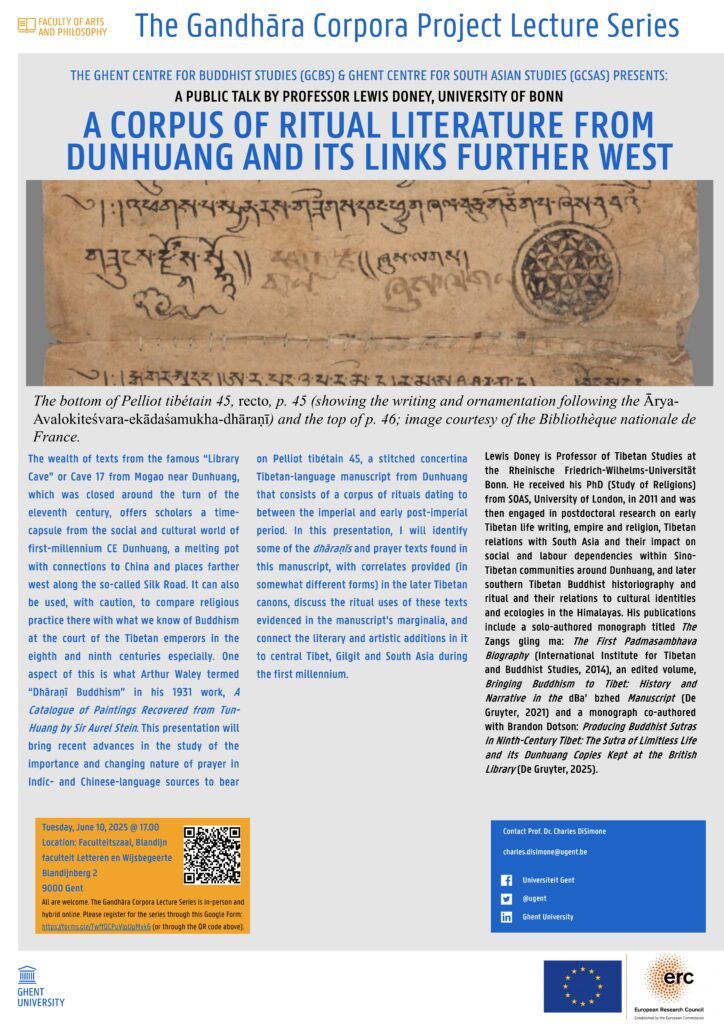We are excited to announce the second lecture in our ongoing “Gandhāra Corpora Project Lecture Series”, featuring Prof. Lewis Doney from the University of Bonn! The lecture series is organized by Prof. Charles DiSimone, leader of the ERC-funded project “Corpora in Greater Gandhāra: Tracing the development of Buddhist textuality and Gilgit/Bamiyan manuscript networks in the first millennium CE” at the Ghent Centre for Buddhist Studies.
Title: A Corpus of Ritual Literature from Dunhuang and its Links Further West
Speaker: Lewis Doney, University of Bonn
Timing: Tuesday, June 10, 2025 @17.00
Location: Faculteitszaal, Blandijn faculteit Letteren en Wijsbegeerte (Blandijnberg 2, 9000 Gent)
In-person and ONLINE
All are welcome. Please register for the series through this Google Form: https://forms.gle/TwffQCPuVipUpMvk6
Abstract:
The wealth of texts from the famous “Library Cave” or Cave 17 from Mogao near Dunhuang, which was closed around the turn of the eleventh century, offers scholars a time-capsule from the social and cultural world of first-millennium CE Dunhuang, a melting pot with connections to China and places farther west along the so-called Silk Road. It can also be used, with caution, to compare religious practice there with what we know of Buddhism at the court of the Tibetan emperors in the eighth and ninth centuries especially. One aspect of this is what Arthur Waley termed “Dhāraṇī Buddhism” in his 1931 work, A Catalogue of Paintings Recovered from Tun-Huang by Sir Aurel Stein. This presentation will bring recent advances in the study of the importance and changing nature of prayer in Indic- and Chinese-language sources to bear on Pelliot tibétain 45, a stitched concertina Tibetan-language manuscript from Dunhuang that consists of a corpus of rituals dating to between the imperial and early post-imperial period. In this presentation, I will identify some of the dhāraṇīs and prayer texts found in this manuscript, with correlates provided (in somewhat different forms) in the later Tibetan canons, discuss the ritual uses of these texts evidenced in the manuscript’s marginalia, and connect the literary and artistic additions in it to central Tibet, Gilgit and South Asia during the first millennium.
Bio:
Lewis Doney is Professor of Tibetan Studies at the Rheinische Friedrich-Wilhelms-Universität Bonn. He received his PhD (Study of Religions) from SOAS, University of London, in 2011 and was then engaged in postdoctoral research on early Tibetan life writing, empire and religion, Tibetan relations with South Asia and their impact on social and labour dependencies within Sino-Tibetan communities around Dunhuang, and later southern Tibetan Buddhist historiography and ritual and their relations to cultural identities and ecologies in the Himalayas. His publications include a solo-authored monograph titled The Zangs gling ma: The First Padmasambhava Biography (International Institute for Tibetan and Buddhist Studies, 2014), an edited volume, Bringing Buddhism to Tibet: History and Narrative in the dBa’ bzhed Manuscript (De Gruyter, 2021) and a monograph co-authored with Brandon Dotson: Producing Buddhist Sutras in Ninth-Century Tibet: The Sutra of Limitless Life and its Dunhuang Copies Kept at the British Library (De Gruyter, 2025).
